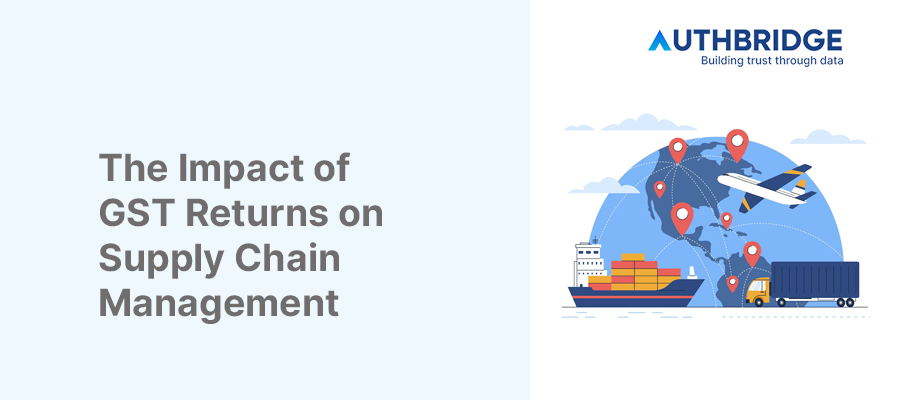Understanding GST Returns On Supply Chain Management: Impact, Strategies, And Compliance

Overview of GST in India
The Goods and Services Tax (GST) was introduced in India as a comprehensive indirect tax on the manufacture, sale, and consumption of goods and services throughout the country. It replaced multiple cascading taxes levied by the central and state governments, streamlining the tax structure and aiming to enhance the ease of doing business.
The Concept of Supply Chain Management
Supply Chain Management (SCM) encompasses the planning and management of all activities involved in sourcing, procurement, conversion, and logistics management. It also includes coordination and collaboration with channel partners, which can be suppliers, intermediaries, third-party service providers, and customers.
GST's Impact on Supply Chain Dynamics
Elimination of Cascading Tax Effects
One of the most significant impacts of GST on supply chain management is the elimination of the cascading effect of taxes, where tax was previously levied on tax. GST has made the tax structure more transparent and has reduced the overall tax burden on goods, positively affecting the supply chain's efficiency and costs.
Simplification of Tax Structure
GST has simplified the tax structure by subsuming various central and state taxes into a single tax system. This simplification has led to easier compliance, reduced paperwork, and smoother interstate movement of goods, thereby enhancing the operational efficiency of supply chains.
Changes in Warehouse and Inventory Management
Centralization vs. Decentralization of Warehouses
Prior to GST, businesses often opted for multiple warehouses across states to avoid interstate tax. Post-GST, the need for such practices has diminished, encouraging businesses to rethink their warehouse strategy. Many have moved towards centralizing their warehouses or choosing strategic locations to optimize logistics and reduce costs.
Impact on Inventory Costs and Management
The streamlined tax system under GST has also impacted inventory costs and management practices. With reduced tax burdens and centralized warehousing, businesses can now hold lesser inventory, leading to lower inventory costs and more efficient inventory management.
Transportation and Logistics Under GST
Reduction in Transit Times
The implementation of GST has significantly reduced transit times across state borders due to the subsumption of various entry taxes and the introduction of the e-Way bill. This has streamlined the process of goods movement, leading to faster delivery times and enhanced customer satisfaction.
- Table 1: Impact on Transit Times
Aspect | Pre-GST | Post-GST |
State Border Delays | High due to various taxes and checks | Reduced significantly with e-Way Bill |
Average Transit Time | Longer due to multiple checkpoints | Shorter due to streamlined processes |
Cost Efficiency in Logistics
GST has led to cost efficiencies in logistics by eliminating multiple state taxes, leading to a reduction in logistics costs. This has not only improved the bottom line for businesses but also made Indian goods more competitive in the international market.
- Table 2: Logistics Cost Efficiency
Aspect | Pre-GST | Post-GST |
Logistics Cost as % of GDP | Higher due to inefficiencies | Reduced, aligning with global standards |
Warehouse Operational Costs | Higher due to decentralized model | Lower due to centralized warehousing |
GST Returns and Compliance in Supply Chain
Filing GST Returns: Challenges and Solutions
Filing GST returns involves detailing outwards and inwards supplies, which can be challenging due to the volume of transactions. Automating the process through GST-compliant software can help in timely and accurate filing, thereby ensuring compliance and smooth supply chain operations.
Compliance Impact on Supply Chain Efficiency
Compliance with GST not only involves filing returns but also ensuring accurate Input Tax Credit (ITC) claims. Efficient management of ITC can significantly impact the cash flow and working capital, thereby affecting the supply chain's efficiency.
Technology and Automation in GST Compliance
Role of Technology in Managing GST Returns
Technology plays a crucial role in managing GST returns efficiently. GST software solutions help in automating the return filing process, tracking ITC, and ensuring compliance, thereby reducing the manual effort and chances of errors.
Automation in Supply Chain for GST Compliance
Integrating GST software with supply chain management systems can provide real-time visibility into the tax liabilities and credits across the supply chain. This integration helps in making informed decisions, optimizing tax credits, and enhancing supply chain efficiency.
Case Studies: Before and After GST Implementation
Comparative Analysis of Supply Chain Efficiency
Several businesses have reported improved supply chain efficiency post-GST implementation. Centralized warehousing, reduced transit times, and cost efficiencies in logistics are some of the key areas of improvement.
- Table 3: Comparative Analysis of Supply Chain Efficiency
Parameter | Pre-GST Scenario | Post-GST Scenario |
Warehouse Strategy | Decentralized | Centralized/Strategic |
Transit Times | Longer | Shorter |
Logistics Cost | Higher | Lower |
Real-life Examples of GST Impact on Businesses
Case studies of companies from various sectors, including FMCG, manufacturing, and e-commerce, have shown positive impacts of GST on their supply chain operations. These include reduced operational costs, improved cash flows, and enhanced competitiveness.
Conclusion
The introduction of GST in India has been a game-changer for supply chain management. By simplifying the tax structure, reducing logistics costs, and enhancing operational efficiencies, GST has positively impacted businesses across sectors. As companies continue to adapt to this tax regime, leveraging technology and automation for compliance and efficiency will be key to gaining a competitive edge in the market.
Category

Abhinandan Banerjee
(Associate Manager - Marketing)
Abhinandan is a dynamic Product and Content Marketer, boasting over seven years of experience in crafting impactful marketing strategies across diverse environments. Known for his strategic insights, he propels digital growth and boosts brand visibility by transforming complex ideas into compelling content that inspires action.



